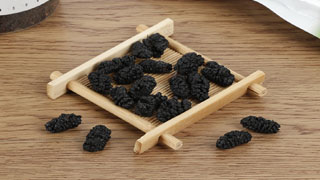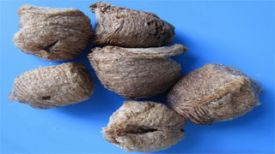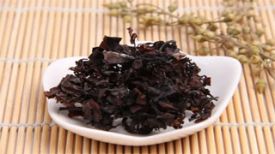
1. Alias
Mulberry, mulberry fruit, black mulberry, Wenwu fruit.
2. Plant morphology
Deciduous shrubs or small trees, 3-15 meters tall. The bark is gray white with shallow strip-shaped cracks; The root bark is yellow brown or reddish yellow, with strong fibrosis. Single leaf mutualism; The petiole is 1-2.5 centimeters long; The leaves are ovate or broadly ovate, measuring 5-20 cm in length and 4-10 cm in width, with a sharp or gradually pointed tip and a rounded or nearly heart-shaped base. Monoecious flowers, dioecious plants; Both female and male inflorescences are arranged in spike like inflorescences, axillary. Achenes, mostly densely clustered into an oval or oblong aggregate fruit, measuring 1-2.5 centimeters in length, initially green, but turning fleshy, black purple or red upon maturity. The seeds are small. The flowering period is from April to May, and the fruiting period is from May to June.
3. Origin distribution
Born on hills, slopes, villages, fields, etc., it is mostly cultivated artificially. Distributed throughout the country.
4. Harvesting and processing
Harvest from April to June when the fruit turns red, dry in the sun, or steam and dry in the sun.
5. Characteristics of medicinal herbs
Juhua fruit is composed of numerous small achenes, with a surface ranging from yellow brown to dark purple and short peduncles. The small achene is oval in shape and has 4 external cytoplasmic flower petals. Mild aroma, slightly sour and sweet taste.
6. Sexual Taste Returning to the Classics
Cold in nature, sweet and sour in taste. Returning to the Heart Meridian, Liver Meridian, and Kidney Meridian.
7. Effect and Function
Nourish blood and yin, generate fluids and moisten dryness. Belonging to the subcategory of tonifying deficiency medicine, it is a blood supplement medicine.
8. Clinical application
Take 9-15 grams and decoct in water. Used to treat dizziness, tinnitus, palpitations, insomnia, premature graying, fluid damage, thirst, internal heat, blood deficiency, and constipation.
9. Pharmacological research
Enhance immune function; Reduce Na+- K+- ATPase activity.
10. Chemical composition
Ears contain sugar, tannic acid, malic acid, vitamins B1 and B2, and carotenoids [1]; The main fatty acids in its lipids are linoleic acid, oleic acid, and palmitic acid, which are determined by the hot dip method under the alcohol soluble extract determination method (Appendix X A) using 85% ethanol as the solvent and not less than 15.0%
11. Usage taboos
People with spleen and stomach deficiency, cold, and loose stools should take it with caution.
12. Compatibility prescription
① Treatment for insomnia or habitual constipation caused by heart and kidney weakness: 30-60 grams of fresh mulberries. Boil and take orally with an appropriate amount of water. (Minnan Folk Herbs)
② Treating scalding and fire injuries: Use black ripe mulberries, collect them in a clean bottle, and they will naturally become water over time. Use chicken feathers to sweep and apply. (One Hundred and One Choices)
③ Treating scrofula: Mulberry, black ripe for about two dou. Take the juice from a cloth bag, boil it into a thin paste, order a spoonful of white soup, and take it three times a day. (Wenwu Gao from "Baoming Collection")
④ Treatment for alcohol poisoning: dry mulberries combined. Take one liter of wine and soak for a while. Take the wine and swirl it to drink, and it will be dissolved. (St. Francis of Assisi)
⊙ The content of the article is for clinical reference only. Non TCM professionals are not allowed to test drugs.


